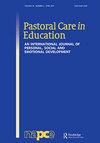“Reflections on 40 years of pastoral care in education”
IF 0.9
Q3 EDUCATION & EDUCATIONAL RESEARCH
引用次数: 0
Abstract
Welcome to this Special Issue of Pastoral Care in Education in which we celebrate the 40th Anniversary of the journal’s membership association, the National Association for Pastoral Care in Education (NAPCE). NAPCE was founded in October 1982 to establish links between education professionals and allied agencies who have an interest in pastoral care, personal and social education and the welfare of students of all ages in schools. Over 300 teachers attended the inaugural conference in Dudley, England, at which the founding chair Michael Marland, spoke of the challenges faced by many thousands of teachers with responsibility for pastoral care despite very little training or support at local or national level and with limited focus during Initial Teacher Training. The first issue of NAPCE’s journal Pastoral Care in Education was subsequently published in February 1983 and in the editorial, Peter Ribbins, Maura Healy and Peter Lang warned that in these ‘hard times for education . . . we shall probably have to be vigilant and fight hard if pastoral provision is not to be reduced to a rump’ (Ribbins et al., 1983, p. 1). The first issue comprised eight articles which focused on a range of themes including ‘Rethinking the Pastoral-Academic Split’ (Ron Best and Peter Ribbins), ‘The Pastoral Head’ (Keith Blackburn), ‘Preparing for Promotion in Pastoral Care’ (Michael Marland) and ‘Teacher-Based Research and Pastoral Care’ (Bob Burgess). Self-evidently the educational policy context was very different 40 years ago. The year 1982 marked the halfway point between Prime Minister James Callaghan’s influential Ruskin College speech in 1976 (which launched what would be known as the ‘great debate’ about the nature and purpose of education in the UK) and the introduction in 1988 of Kenneth Baker’s Education Reform Act and the first statutory National Curriculum in England and Wales. Fast forward 40 years and it seems that our world has changed immeasurably: globally we continue to emerge from the greatest pandemic in a century (Covid-19) which is reported to have caused 6 million deaths worldwide; we face enormous challenges to address climate change which is fuelling weather extremes, natural disasters and environmental degradation; and in recent months we have witnessed the Russian invasion of Ukraine, leading to the largest refugee crisis since World War II with almost 9 million Ukrainians fleeing their home country and a third of the population displaced. Educationally too, much has been written about the increased accountability imposed on our school systems, ostensibly aiming to raise standards and generate improved outcomes, but arguably resulting in increased managerialism, an unhealthy focus on ‘teaching to the test’ and a lack of trust in school PASTORAL CARE IN EDUCATION 2022, VOL. 40, NO. 3, 257–260 https://doi.org/10.1080/02643944.2022.2101778“教牧关怀四十年反思”
欢迎来到本期《教牧关怀》特刊,我们在本期中庆祝该杂志的会员协会——全国教牧关怀教育协会(NAPCE)成立40周年。NAPCE成立于1982年10月,旨在建立对教牧关怀,个人和社会教育以及学校各年龄段学生福利感兴趣的教育专业人员和联盟机构之间的联系。300多名教师参加了在英国达德利举行的首届会议,创始主席Michael Marland在会上谈到了数千名负责教牧关怀的教师所面临的挑战,尽管在地方或国家层面上几乎没有培训或支持,而且在初级教师培训期间的重点也很有限。NAPCE的期刊《教牧关怀教育》的第一期随后于1983年2月出版,在社论中,彼得·里宾斯、莫拉·希利和彼得·朗警告说,在这些“教育的艰难时期……如果牧养供应不被减少到残余物,我们可能不得不保持警惕和努力奋斗”(里宾斯等人,1983年,第1页)。第一期包括八篇文章,重点关注一系列主题,包括“重新思考牧养-学术分裂”(罗恩·贝斯特和彼得·里宾斯),“牧养头”(基思·布莱克本),“准备在牧养中推广”(迈克尔·马兰)和“以教师为基础的研究和牧养”(鲍勃·伯吉斯)。不言而喻,40年前的教育政策背景与现在大不相同。1976年,英国首相詹姆斯·卡拉汉(James Callaghan)在拉斯金学院(Ruskin College)发表了颇具影响力的演讲(这场演讲引发了关于英国教育的性质和目的的“大辩论”),1988年肯尼斯·贝克(Kenneth Baker)的《教育改革法案》出台,英格兰和威尔士的第一个法定国家课程也在1982年颁布。快进40年,我们的世界似乎发生了不可估量的变化:在全球范围内,我们继续摆脱百年一见的大流行(Covid-19),据报道,这场大流行在全球造成600万人死亡;我们在应对气候变化方面面临巨大挑战,气候变化正在加剧极端天气、自然灾害和环境退化;最近几个月,我们目睹了俄罗斯对乌克兰的入侵,导致了二战以来最大的难民危机,近900万乌克兰人逃离祖国,三分之一的人口流离失所。在教育方面,也有很多关于我们的学校系统增加问责制的文章,表面上是为了提高标准和产生更好的结果,但可以说导致了管理主义的增加,对“考试教学”的不健康关注以及对学校教牧关怀缺乏信任。3,257 - 260 https://doi.org/10.1080/02643944.2022.2101778
本文章由计算机程序翻译,如有差异,请以英文原文为准。
求助全文
约1分钟内获得全文
求助全文

 求助内容:
求助内容: 应助结果提醒方式:
应助结果提醒方式:


